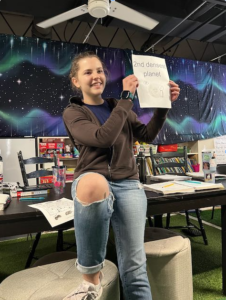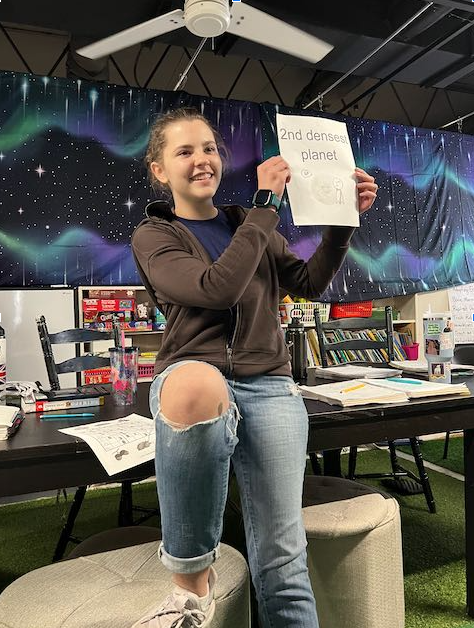Have you ever been asked to show someone how to do something you already know how to do or tell someone about a topic you feel you know a lot about? Sometimes it is easier said than done. When you are put in the position to teach others it is a quick way to determine how knowledgeable you actually are about a topic. It also forces you to review what you know and as a result you increase your depth of understanding. When you can make these deeper connections you commit the information to a more long term memory. These are just a few of the benefits our students get by teaching others.
The last few months of my unit on astronomy were spent with each student preparing a lesson to teach about a planet in our solar system. This allows each child to research a skill even further than the foundational knowledge that they have so that they can explain it to their classmates. In return they acquire new knowledge while exploring at their own pace and to the level that will challenge them the most. Their lesson plans have to include a hands-on activity and should include at least two different learning styles (kinesthetic, auditory, visual, reading/writing). They take the responsibility seriously and naturally put a lot of effort into their lessons so that they can teach their peers everything they need to know.

It takes a lot of courage to get up in front of a group of people, but getting up in front of a group of your peers who are cheering you on and supporting you is a pretty incredible way to practice. Not to mention, to be allowed to think outside of the box and come up with a unique way to help your classmates learn all they can about a planet is invigorating.
- Just ask Casey who taught a group of his fellow 8th graders a dynamic lesson about Saturn by incorporating a game that involved a ring toss if you answered the question correctly. He had all of us, including me, incredibly excited about learning more about this gas giant and its extreme weather conditions.
- Loen was incredibly creative when she made a replica of the planet Uranus out of cardboard and created a dice that you rolled to answer a question about the weather, location & features, atmosphere, compare & contrast to earth, history & facts, or something new you learned, for example the planet rotates at a 90 degree angle. Her game was so much fun I used it with both cohorts to review all that we learned from the entire unit.
- Quinn demonstrated an incredible level of confidence when he taught his lesson because he practiced and put the effort in required to deliver his lesson with eye contact and enthusiasm. Then as every good teacher has to do when they teach, had to problem solve in the midst of an engaging activity that involved building the layers of his planet out of candy and we were running out of time.
Not only are our kids having fun while making deeper connections to the content when they are given the opportunity to teach others, but they are also practicing their presentation skills, building their confidence, practicing how to communicate with others in an engaging way, and ultimately preparing to be the leaders of tomorrow whether as a successful college student, teacher, astronaut, or aeronautical engineer.


